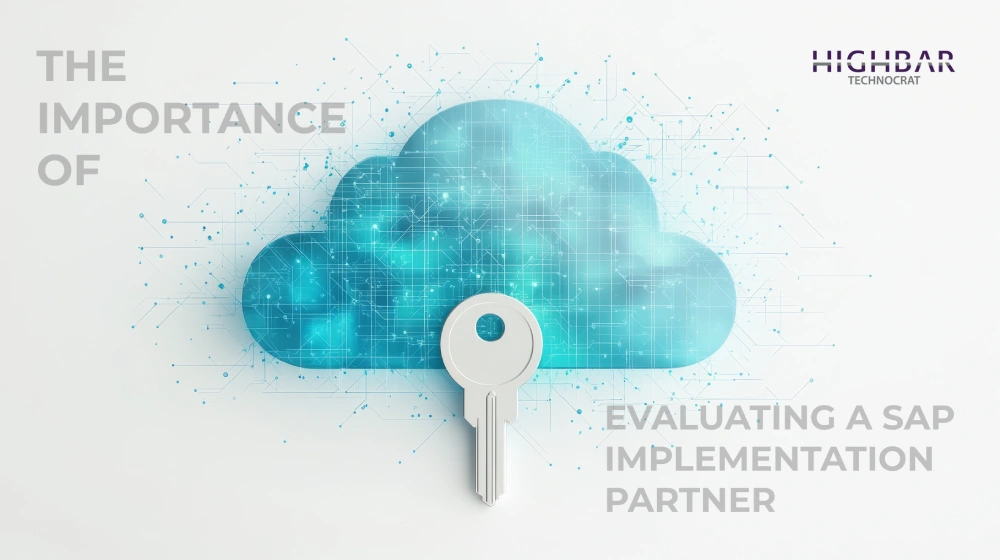Choosing the Right SAP Implementation Partner: A Comprehensive Guide to Evaluation Criteria
- Highbar Technocrat
- Blogs
- December 16, 2023
Connect With Us
Choosing the Right SAP Implementation Partner: A Comprehensive Guide to Evaluation Criteria
- Highbar Technocrat
- Blogs
- December 16, 2023
Connect With Us

Selecting the right SAP implementation partner is crucial for the success of your enterprise resource planning (ERP) project. The wrong choice can lead to cost overruns, delays, and a system that doesn’t meet your business needs. To ensure a smooth and successful SAP implementation, it’s essential to establish a robust evaluation process for potential partners. This blog post provides a detailed guide to the essential criteria you should consider when evaluating SAP implementation partners.

Key challenges to evaluate SAP implementation partner
When evaluating SAP implementation partners, it’s essential to consider various challenges that could impact the success of the project. Here are five key challenges to assess when evaluating potential SAP implementation partners:
Lack of Industry Expertise:
- Challenge: If the SAP implementation partner lacks experience or expertise in your industry, they may need help understanding and addressing industry-specific challenges and requirements.
- Evaluation Criteria: Assess the partner’s industry experience by reviewing case studies and client references and asking specific questions related to your industry’s unique needs
Insufficient SAP Knowledge and Certification:
- Challenge: Inadequate knowledge of SAP solutions and lack of certification can lead to suboptimal implementations and difficulties in resolving issues.
- Evaluation Criteria: Verify the partner’s SAP certifications, ensuring their consultants have the necessary training and expertise. Ask about their experience with the specific SAP modules relevant to your project.
Poor Project Management Practices:
- Challenge: Ineffective project management can lead to delays, cost overruns, and miscommunication, impacting the overall success of the SAP implementation.
- Evaluation Criteria: Assess the partner’s project management methodologies, communication plans, and risk management strategies. Look for evidence of successful project deliveries within scope, time, and budget.
Inadequate Change Management Capabilities:
- Challenge: SAP implementations often involve significant changes to existing business processes. A lack of focus on change management can result in user resistance and difficulties in adapting to new workflows.
- Evaluation Criteria: Evaluate the partner’s change management approach. Look for evidence of their ability to facilitate organizational change, provide user training, and ensure a smooth transition to the new SAP system.
Limited Post-Implementation Support:
- Challenge: Inadequate post-implementation support can lead to extended downtime, unresolved issues, and a negative impact on business operations.
- Evaluation Criteria: Assess the partner’s post-implementation support services, including the availability of support staff, response times, and the structure of support agreements.
Consider client references regarding their experiences with post-implementation support. Addressing these challenges during the evaluation process is crucial to mitigate risks and increase the likelihood of a successful SAP implementation. Engage in open communication with potential partners, ask for specific examples of these challenges, and seek assurances that they have the expertise and strategies to overcome them. Additionally, conducting thorough reference checks with previous clients can provide valuable insights into how well the partner has addressed these challenges in real-world scenarios. Hence, Evaluating SAP implementation partners is a crucial step in ensuring the success of your SAP project.

Here are some key reasons why evaluating a SAP implementation partner is important
Expertise and Knowledge:
SAP projects are complex and require a deep understanding of SAP’s functionalities, modules, and best practices. An experienced SAP implementation partner brings expertise and knowledge, reducing the risk of errors and ensuring a more efficient implementation.
Industry-Specific Experience:
Different industries have unique requirements and challenges. A SAP implementation partner with experience in your industry is better equipped to understand your specific needs and tailor the SAP solution accordingly.
Project Management Skills:
SAP implementations involve multiple phases, tasks, and stakeholders. A competent implementation partner should have strong project management skills to ensure the project stays on schedule, within budget, and meets the specified goals.
Technical Proficiency:
SAP implementations involve intricate technical configurations. An evaluation helps verify that the implementation partner has the necessary technical skills to handle SAP’s complexities, ensuring a smooth deployment.
Customization and Integration Capabilities:
Businesses often require SAP solutions to be customized to fit their unique processes. Additionally, integration with existing systems is critical. A capable partner should demonstrate expertise in customization and integration to meet your organization’s specific needs.
Scalability and Flexibility:
Businesses evolve, and so should their ERP systems. A reliable SAP implementation partner can design a scalable and flexible solution, accommodating your organization’s growth and adapting to changes in the business environment.
Change Management and User Adoption:
Change management is a significant aspect of any ERP implementation. A good partner helps manage the transition, addressing resistance to change and ensuring end-users are adequately trained and comfortable with the new system.
Post-Implementation Support:
The support provided after the go-live phase is crucial. A capable implementation partner offers post-implementation support, addressing issues that may arise and ensuring the long-term success and stability of the SAP system.
Compliance and Security:
Many industries have specific compliance requirements, and security is a paramount concern. A thorough evaluation ensures the SAP implementation partner adheres to relevant compliance standards and implements robust security measures.
Cost Management:
Evaluating potential partners allows you to understand their pricing models and overall cost structure. This helps make informed decisions based on your budget and ensures no surprises during or after the implementation.
Vendor Relationship:
The relationship with the SAP implementation partner is not just for the project duration but often extends into ongoing support and future upgrades. Choosing the right partner builds a long-term relationship that can be beneficial for future initiatives.
Risk Mitigation:
By thoroughly evaluating potential partners, you can identify and mitigate risks early in the process. This proactive approach helps prevent issues during the implementation and minimizes the chances of project failure.
Conclusion
In summary, evaluating an SAP implementation partner is essential to mitigate risks, ensure a successful project outcome, and maximize the return on investment in SAP technology. It allows you to choose a partner that aligns with your organization’s goals, understands your industry, and possesses the necessary skills and experience for a successful SAP implementation.




